Interview with Ellen Kushner (SWORDSPOINT)
Ellen Kushner is the author of the iconic Swordspoint (1987), a tale of queer romance between witty swordsmen in an unnamed fantastical city that has become one of the most well-loved Fantasy novels of the 80s. It was followed by The Fall Of The Kings (2002), written with her wife Delia Sherman, and The Privilege Of The Sword (2006), set at different points in the city’s history and featuring different characters but maintaining Kushner’s trademark charm and wit.
Her second novel, Thomas The Rhymer (1990), a retelling of the Child ballad, won the World Fantasy Award and the Mythopoeic Award. She has edited and contributed to Terri Windling’s shared world Borderland series, and is the co-founder and past president of the Interstitial Arts Foundation.
Ellen Kushner was in London for Gollanczfest and was kind enough to talk with The Fantasy Hive while she was there.
Hi Ellen, and welcome to the Hive. Would you be able to tell us a bit about your Swordspoint books?
Well, it’s very important to know that they’ve all been written out of order. The very first one, which is still the first one, is called Swordspoint: A Melodrama Of Manners. I wrote it back in my 20’s, and it’s been in print pretty much ever since. It’s set in an imaginary city with no magic that is based on all my favourite periods of history; from Elizabethan London, to eighteenth century Paris, to the New York that I was living in in the 1980’s which was a bad and dangerous and beautiful place. It concerns the affairs of a renegade scholar of mysterious origins named Alec who will not give his last name and who is extremely self-destructive; and Richard St Vier, the greatest swordsman in the city, who lives in the worst part of town because nobody bothers him there. At the beginning of the novel, they’ve already been together as a couple for a number of months I would say.
I’ve gone back and written stories about them at other periods in their lives, both individually and collectively over the past thirty years since I wrote the novel. My challenge to myself is always to do something different with the style of the narrative, with the viewpoint, so that I’m not repeating myself; which in some ways is a mistake because people would love it if I repeated myself. The people who like the novel just want more of that! So I have done two other novels as well, written out of order. So if you’re trying to read them in the order that things happen in that world, you’ll want to read The Privilege Of The Sword first, that is a narrative from the point of view of Alec’s niece, a 15 year old girl. And after that we skip forward a generation to The Fall Of The Kings, which is very much about the university which you hear about in the other books but you never actually visit. So in The Fall Of The Kings you go to the university, and I wrote that with my wife Delia Sherman who has a PhD and had some scores to settle.
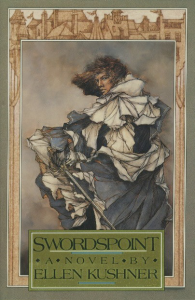 The books are known for the wittiness of the dialogue and the interplay between the characters. How important is establishing that dialogue when you’re writing?
The books are known for the wittiness of the dialogue and the interplay between the characters. How important is establishing that dialogue when you’re writing?
To me that’s the fun part. That’s what I like to do, and one of the things that I think I do best. So, it’s not so much that it’s important as it’s the fun part, and that I have to think of a plot to go with it.
When you think of these characters, does the voice come straight away or do you have to work on them to find it?
Well I’d been living with these characters for a while when I first wrote the book. I kept trying to write short stories about them and they were a horrible failure and my friends – I was living in New York and working in publishing at the time, so I had a lot of friends in the business – they said, just stop it, all your stories read like chapters from a novel, just give up and write the novel! So about half of them in the novel already existed and the other half, they really did sort of come to me just as they were.
Swordspoint is an early text in Fantasy dealing with queer and bisexual characters and relationships, which was unusual at the time but is something that we are seeing more of as more diverse voices become a part of Fantasy. How do you feel the genre has changed since you wrote it, in terms of the writers and fandom that it’s welcoming?
Well basically everybody’s out now, and some of that is because of the internet. There was fanfic slashing men who were not written as couples way back then. I hadn’t read any. I had heard it existed, I don’t think I had seen any. But I wasn’t that interested in it, I just turned out to have the same tastes as a whole two generations of girls. I thought I was the only one and that I was really weird. But I wrote it anyway because it was what I wanted to write. And to find out that now it’s mainstream for weird girls to write this kind of thing and to write fanfic and basically to find that sort of coupling attractive… I have very mixed feelings about that. Part of me is, if only I had known that this was completely normal, and part of me thinks, hey people, it’s wonderful that we’ve all found each other now but I’m not special anymore, am I!
But in the greater scheme of things, just the fact that there can be queer characters and that people all over the spectrum accept them and are interested in them and that a book is not going to be rejected, at least not in our field, because it has queer characters, I think is wonderful. I really think that it reflects the world around us. Even for me writing in the 1980’s; I was living in a New York City that was very much dominated pre-AIDS by gay male culture, and I think that that had its effect on what I was writing. Since then in popular culture there have been more and more queer characters, on TV and in films and then in books, and the Gay Straight Alliance in high schools in America, and so it’s just become one part of a really big mainstream. So it does not surprise me at all that people are writing queer Fantasy and science fiction and that it’s being accepted.
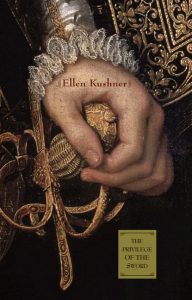 The Swordspoint books do get categorised as Fantasy but as you said, they don’t feature magic. Was this an issue when you were pitching the book to publishers?
The Swordspoint books do get categorised as Fantasy but as you said, they don’t feature magic. Was this an issue when you were pitching the book to publishers?
Yes, it was a big issue. People pointed out that it crossed several genres, that there was a way in which it was like a Western – Richard is like the honourable gunslinger. It was queer and there was no magic, but it was cloaks and swords. I got a lot of rejections from people, a lot, saying this is a wonderful book—I don’t know how I would publish it.
Do you feel like now that the books have found their place in the wider Fantasy culture, that Fantasy is a bit more accepting of books that do strange and different things?
Absolutely. When it was published almost all Fantasy was Tolkienian and/or rural, and it was my generation of people living in cities that had become the new frontier, wanting to write about our own experiences and our own adventures but in a fantasy context. So you had people like Emma Bull writing War For The Oaks (1987). Suddenly urban became a thing, and I don’t mean urban fantasy the way it’s come to mean, but literally fantasy set in cities wasn’t happening. Fantasy not inspired by the middle ages but by the Renaissance and the Regency period, that wasn’t happening. But I didn’t invent it, I think I was just the first to publish a book that got a lot of notice about it. Patricia Wrede and Caroline Stevermer’s The Enchanted Chocolate Pot (1988) was really the first Regency Fantasy, and now they’re a genre. But it was our passions and our tastes, and following those way back when, that was simply happenstance. I don’t think people are imitating us, I think it’s just what people want to write.
What is it about that kind of Regency, Georgette Heyer thing, that speaks to so many Fantasy fans?
Boy you should get an interview with Alexei Panshin, who wrote a wonderful series, and I’m just quoting what I have read, and what I’ve been told, which is basically that the Georgette Heyers were really big in the 1960’s still. She’d been publishing since I think the 40’s, she published into the 70’s until she died. But all the ladies were reading the Georgette Heyers, and all the guys in science fiction and Fantasy, it was really science fiction then, their girlfriends and their wives were reading these books and just cackling. And the men said what are you reading? And they were like, oh you wouldn’t understand, but here you can read this one, and the men loved it.
What I think is that the Georgette Heyers have the same pleasure that Fantasy gives us, which is a completely created world with its own rules. They’re almost like the rules of magic, how you get by in society. And she made that up. She did a lot of research on the Regency period, but she was also referencing the Edwardian period she grew up in. And so it’s a kind of happy mixture of the two. Really, what one loves about those books is that it’s a very tight, taught world, and I think it gives the same pleasure Fantasy does—which is just that we’re going somewhere else and it is very specific unto itself. I think that’s why I was able to get away with Swordspoint, because I did not think that it was Fantasy, but I knew it wasn’t anything specific. But people will tell me, oh yes, yes it’s Fantasy. And I’ll say really, well why do you think that? They’ll say it gives me the same feeling, the same pleasure that reading Fantasy does. And that’s fine by me.
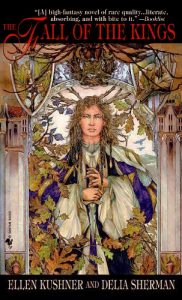 The sequels to Swordspoint jump ahead across generations and show different characters interacting with different parts of the world, and as a result they’re quite different books. Is that how you like to approach writing sequels?
The sequels to Swordspoint jump ahead across generations and show different characters interacting with different parts of the world, and as a result they’re quite different books. Is that how you like to approach writing sequels?
Absolutely. I really didn’t want to repeat myself, and I didn’t want to do an endless string of sequels. At the time, that was not cool, to be very honest. Now it’s cool, and I would do it again in a heartbeat. And we must all stop and shed a tear for the Richard and Alec novels that will never be written! So that was part of my bargain with myself, not to repeat myself.
I loved the characters, and as the years passed and I watched my life, my friends, and—most importantly—my city, New York City (which I was no longer living in so it made it even more vivid to me that it changed over the years), I thought: well damn, that’s going on in my imaginary city too and I want to play with that. See how things have changed. I want to see these people at different parts of their lives, just as I am at different points in my life.
Jo Walton did me an enormous favour when she reviewed The Fall Of The Kings, and said ‘Ellen Kushner is not writing a Fantasy series, she’s writing a family saga’. And I thought oh thank god you’re right, I hadn’t thought of that. I felt guilty, I really did, this was honestly a big trouble to me, that my Fantasy epic was breaking all the rules and I was doing it wrong, and oh it wasn’t really a Fantasy epic, but what was it? So for her to say, oh it’s a family saga, she didn’t know I needed to hear that, but I really did. The minute she said that I thought, oh she’s right, and started thinking about the ways that I could really honour that, which is partly where Tremontaine comes in. When I mentioned the other books I’ve written and the short stories, I left out of the sequence the very very newest, which is a collaborative serial series only online and in audio from Serial Box, which is a prequel to Swordspoint set 15 years before to make darned sure that the characters from Swordspoint aren’t in it except as babies, which they are, and we can see the origin of some of the older characters in Swordspoint.
The Tremontaine project is really interesting, you’ve done it collaboratively with a bunch of different authors and it goes up online as a series. What attracted you to writing in this very different way from the novel?
Someone asked me to. Really, my old friend Julian Yap, who I remember when he was in college he came to a World Fantasycon and asked me to sign his Swordspoint, so we go way back. He took it into his head to try and do linked novelettes like a TV series. He did the first one with Max Gladstone and friends, and then came to me and said would you do one too about your world because I love it. I thought for about two days and said, yeah I would love to do that, as long as I can get writers who already know and love the series, so I know they’ll be invested. But then I was so thrilled to watch the city grow. I mean cities are alive. Different people know different corners of them. And so each new writer who came in brought a different corner of the city with him or her, and that was really exciting.
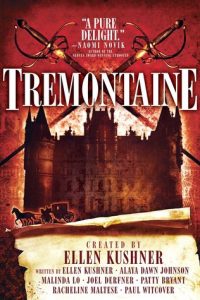 It sounds like you found that collaborative process really positive…
It sounds like you found that collaborative process really positive…
I loved it. It was not my first time either. I worked on the Terri Windling Bordertown series, and so even though the process was quite different, I know what that’s like, and I love it. I’m a very collaborate-y sort of person. I enjoy it a lot, as long as the people that I’m working with are, you know, sympatique – there really isn’t a word for that in English! – in one way or another. Also, to be fair, any time we’re writing about my world I get final say. So it is both very democratic, but also ultimately I am the benevolent autocrat and I can say, no that isn’t right.
People would come to me and ask me questions, and they would be questions about things I’d never even considered. The one I remember is Malinda Lo asking, where do people who die in Riverside get buried? I don’t know, maybe they throw them in the river – no, no, they don’t do that, there’s a cemetery. And then I could start to see it, as soon as she’d asked the question, but I had never thought of it before. So there was that kind of world approval.
I edited the first series and did a little bit of rewriting, usually on the dialogue, just to make the characters sound the way that they should. Once the first season was done, we had the character voices. When I say ‘make the characters sound the way they should’, I mean there’s just a particular way that the nobles speak. And the other writers did it pretty well, but every now and then there would be something that didn’t work for me, and so I just wanted to get that voice really really clear. But as I say, once that was set up in the first season, and we created a lot of new characters as well, then the people in seasons two, three and four had a template and were able to work off that.
So that’s run for four seasons now…
Yeah we finished the fourth season, and Serial Box did not want a fifth, but I’m sure that if television or film picks it up they’ll want more.
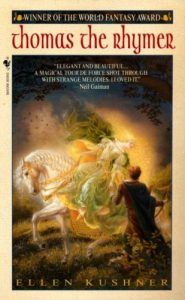
Speaking of which, is there any news in that direction?
Not from anyone with money! Everybody I know wants to have it happen, and I just keep thinking that somewhere there’s a kid who read these books in college or high school and is now immensely wealthy and runs a major network or is about to, they will come to me. I know they’re coming. Hurry up, will you?
You wrote the standalone Thomas The Rhymer based on the Child ballad. What was it that drew you to that particular story? The Child ballads have this big influence across a certain type of Fantasy – there’s the Pamela Dean Tam Lin, and Diana Wynne Jones’ Fire & Hemlock – what keeps us coming back to them?
They’re beautiful. Again I think the language is very particular, in the same way that Georgette Heyer’s language is very particular, in the same way that Tolkien’s language is very particular. They really have their own vocabulary, their own grammar, their own rhythms; and for those of us who love language, for those of us who love the strangeness that is part of Fantasy rather than the familiarity, it’s very attractive. And also the stories are very magical and/or very weird. Again, that’s what I look for in Fantasy. They have their own aesthetic and they have their own rules. So I think that’s what draws us.
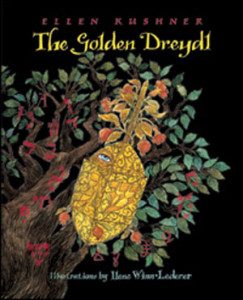
How do you approach something like that in a way that it’s your retelling but you stay true to the source material? Is that a tricky balance to get right?
No I don’t think so. I’ve seen so many people work with this material. My wife Delia Sherman’s first novel [Through A Brazen Mirror, 1989] was based on one, and it’s based on a ballad called The Famous Flower Of Serving-Men, and her treatment of it couldn’t be more different than my treatment of it in Thomas The Rhymer. I think the lovely thing about ballads is, they’re like fairy tales, there’s no characterisation. They’re just a series of events, a series of actions, which often make very little sense, and so it’s delicious to be able to add our 20th or 21st century style of thinking about narrative and adding motivation and characterisation to them. So I think they’re just sitting there waiting for anybody to pick them up.
What’s next for Ellen Kushner?
Well, I’ve done a few other things in between the novels, I’ve done some theatre in New York, I did a children’s book that’s kind of a Jewish version of the Nutcracker called The Golden Dreidel, and I did that as a play, this was about ten years ago. But there’s always a bit of this and that running through my life, I don’t seem to be able to stick to anything much. But right now I’m working on another Tremontaine novel that takes place about 15 years after The Privilege Of The Sword, and it is about Alec’s bastard daughter, the angriest teenager in the world.
Thank you so much Ellen Kushner for speaking with us today!
